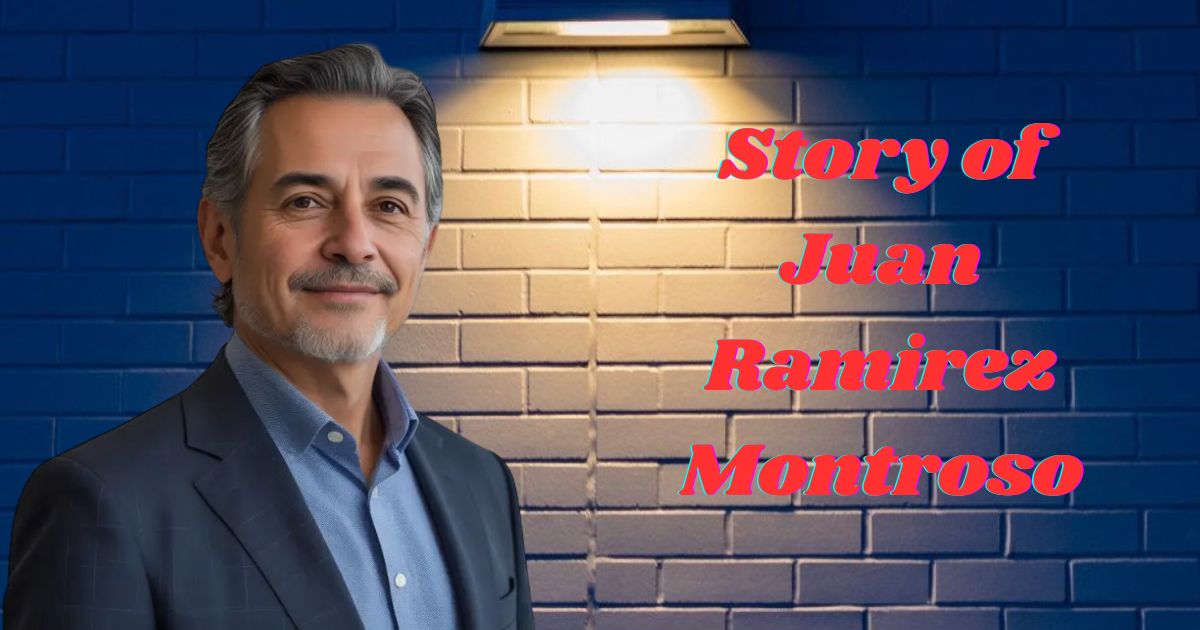Ever heard a name that haunts you? Juan Ramirez Montroso is one of those names.
His story doesn’t fill history books. You won’t find statues celebrating him. Yet the legacy of Juan Ramirez Montroso echoes through generations of American families. He represents millions who built this country with calloused hands and unbreakable spirits.
The life of Juan Ramirez Montroso mirrors your ancestors’ struggles. Maybe your great-grandfather worked the railroads. Perhaps your grandmother crossed an ocean with nothing but hope. Their stories matter. His story matters.
Who was Juan Ramirez Montroso? Let’s uncover the mystery together.
Who Was Juan Ramirez Montroso?
Juan Ramirez Montroso remains wrapped in historical shadows. Records about him? Scarce. Documentation? Limited. But his name surfaces in census records, immigration manifests, and family trees across the Spanish-speaking world.
He likely lived during transformative times. The late 1800s or early 1900s. When railroads stretched across America. When factories hummed day and night. When migration and movement reshaped entire continents.
The scarcity doesn’t diminish his significance. Actually, it amplifies it.
Think about your own family tree. Gaps exist everywhere. Missing pieces. Lost stories. Juan Ramirez Montroso represents those gaps—the ordinary heroes of history whose contributions vanished into unmarked graves.
These individuals built railroads. Harvested crops. Raised families against impossible odds. They worked when their bodies screamed for rest. They persevered when quitting seemed easier.
His story matters because it’s our story. Every family contains someone like Juan. Someone whose Spanish heritage and Latin American culture shaped their identity. Someone who adapted to foreign lands while clinging to ancestral roots.
The mystery surrounding Juan Ramirez Montroso makes reconstruction fascinating. We piece together his life through fragments:
- Census records showing his occupation
- Immigration manifests documenting his journey
- Oral tradition passed through generations
- Family histories whispered at kitchen tables
But his name tells a story.
The Weight of a Name
Names carry universes within them. They preserve family lineage. They encode geographical origins. They transmit cultural values across centuries.
Juan Ramirez Montroso’s full name reveals rich history. Before we know anything else, his name speaks volumes about ancestral memory and identity.
In Spanish last names history, each component matters. First names honor saints or family patriarchs. Surnames map ancestral journeys through time and space. The combination creates unique identifiers connecting past to present.
Think about your own name. What does it reveal?
The Ramirez Legacy
Ramirez ranks among the most common surnames globally. Common doesn’t mean ordinary. Far from it, actually.
This patronymic surname literally means “son of Ramiro“—derived from the Germanic name meaning “famous counselor” or “wise protector.” The meaning of Ramirez surname connects Juan Ramirez Montroso to centuries of Iberian ancestry.
| Ramirez Quick Facts | Details |
|---|---|
| Global Ranking | Top 50 worldwide |
| Primary Locations | Mexico, Colombia, Spain, USA |
| Literal Meaning | Son of Ramiro |
| Historical Origin | Medieval Iberian Peninsula |
| First US Appearance | Early 1800s |
Spanish ancestry and heritage flows through this surname like blood through veins. Countless Ramirez families spread across the Americas during colonial expansion. Each carried traditions, languages, and dreams wrapped in that single name.
When someone says “Ramirez,” they invoke cultural memory stretching back to medieval Spain. Through the Reconquista. Across the Atlantic. Into the New World’s promise and peril.
You’ve probably met a Ramirez. They’re teachers, doctors, construction workers, restaurant owners. Each one carries this legacy.
The Montroso Connection
“Montroso” adds intrigue and specificity. This rarer surname doesn’t appear in standard lists of Spanish last names history. It might derive from Portuguese roots. Or represent a regional variation lost to time.
Some genealogists suggest connections to geographical features. Perhaps “montañoso” (mountainous) corrupted through regional dialects. The etymology of Ramirez Montroso fascinates researchers even today.
The rarity makes Juan Ramirez Montroso distinctive. While millions share “Ramirez,” few carry “Montroso.” This uncommon pairing suggests a specific family lineage worth preserving.
Hidden stories in history often hide in unusual surnames. They mark families who diverged from common paths. Who maintained distinct identities. Or who merged cultures in unexpected ways.
The symbolism of names in heritage becomes especially potent when names resist easy categorization. Montroso sets Juan apart from millions.
This unique name shaped an extraordinary ordinary life.
A Life of Resilience
Resilience wasn’t optional for Juan Ramirez Montroso. It was survival itself.
His life likely unfolded against economic hardship. Political instability. The grinding challenges faced by working-class families in post-colonial Latin America or immigrant communities in the United States.
No safety nets existed back then. No unemployment insurance. No workers’ compensation. Just the worker’s spirit—showing up despite everything.
Early Struggles
Childhood poverty shaped entire generations then. Limited educational opportunities. Early labor. Family responsibilities. These weren’t exceptions but expectations.
Children worked alongside parents from shockingly young ages. Seven years old. Eight. Sometimes younger. The resilience of ordinary people developed through necessity, not choice.
Common Early Life Challenges:
- Economic Privation – Living meal to meal, paycheck to paycheck
- Educational Barriers – Literacy learned informally, if learned at all
- Family Obligations – Supporting siblings and aging parents early
- Cultural Navigation – Balancing old-world traditions with new-world demands
- Physical Hardship – Bodies broken before reaching adulthood
Work started early. Ended late. Never stopped completely.
Education? That was for wealthy families only. Books? Luxuries. Schools? Often miles away or completely inaccessible.
Perseverance and identity intertwined in complex ways. Work degraded and dignified simultaneously. It exhausted bodies while nourishing pride. Resilience through adversity emerged not from positive thinking but from having no alternative except forward motion.
Your great-grandfather probably experienced this. Maybe your grandmother did too.
The Worker’s Spirit
Honest labor defined Juan Ramirez Montroso’s identity. Whether he swung pickaxes, loaded cargo, or worked soil, his hands told his story.
Calloused hands told better stories than diplomas.
The worker’s spirit meant showing up when everything hurt. When weather punished. When bosses demanded and wages insulted. When going home meant disappointing hungry children.
This wasn’t romantic. Manual labor broke bodies and shortened lives. Dangerous equipment. Weather extremes. Minimal wages. No healthcare.
But it also forged community over self. Workers understood that collective survival required mutual support. They shared food during lean times. Nursed each other through injuries. Celebrated small victories together.
The dignity found in honest work transcended material poverty. Men like Juan Ramirez Montroso measured worth differently than society at large. A full day’s work. A kept promise. A family fed. These achievements mattered more than accumulated wealth.
Heroes don’t always wear capes. Often wore overalls.
This spirit connected Juan to something larger.
Juan Ramirez Montroso in the Tapestry of History
Individual threads mean little until woven into larger patterns. Juan Ramirez Montroso existed at cultural crossroads where Old World met New. Where tradition confronted modernity. Where personal identity negotiated collective belonging.
He’s everyone’s ancestor, in a way.
Cultural Crossroads
Spanish heritage blended with American culture complexly. Juan Ramirez Montroso likely navigated multiple linguistic worlds. Spanish at home. English in public spaces. Maybe Portuguese. Possibly indigenous languages.
Each language carried distinct worldviews, values, and possibilities.
Cultural identity isn’t static. It adapts, resists, transforms, and persists simultaneously. Preserving traditions while embracing new opportunities required constant negotiation.
Which customs to maintain? Which to release? How to pass ancestral roots to children born in foreign soil?
| Cultural Navigation Challenge | Juan’s Likely Experience |
|---|---|
| Language Maintenance | Spanish at home, English publicly |
| Religious Practice | Catholic traditions in Protestant-majority areas |
| Food Traditions | Traditional recipes, American ingredients |
| Music & Celebration | Preserving folk traditions generationally |
| Family Structure | Extended families despite geographical separation |
Home felt like Spain. Streets felt foreign.
Which world did he truly belong to? Both. Neither. Something new entirely.
Children became translators for parents. Religious tension simmered in predominantly Protestant America. Food became cultural anchor and memory. Each meal connected families to ancestral homelands they’d never see again.
Migration and Movement
Historical migration patterns shaped Juan Ramirez Montroso’s context. Whether he migrated himself or descended from migrants, movement defined his world.
People left homelands for countless reasons. Economic desperation. Political persecution. Family reunification. Or simply the magnetic pull of possibility.
The journey itself transformed people. Ocean crossings severed old connections while forging new identities. Migrants arrived as one person and became another. Neither fully “from” nor entirely “of” anywhere.
Ship voyage conditions? Brutal. Crowded. Dangerous. Salt air mixed with fear, hope, and confusion. Families clutched meager possessions. Children cried. Adults prayed.
Stories of ordinary heroes in history often center on these journeys. The courage required to leave everything familiar. To trust in uncertain futures. To rebuild from nothing.
This heroism exceeds battlefield valor. Why? It’s sustained over lifetimes rather than moments.
Juan’s journey symbolizes something universal.
Symbolism of His Story
Juan Ramirez Montroso transcends individual biography. He represents universal human themes. Why ordinary stories carry extraordinary weight. How symbolism connects past generations to present.
Representation of Ordinary Heroes
Heroism doesn’t require fame or monuments. The legacy of common people often carries more moral weight than celebrated figures.
Everyday heroes in history like Juan Ramirez Montroso demonstrated courage through persistence. Strength through vulnerability. Wisdom through suffering.
Ordinary heroes raise children on impossible budgets. They work jobs that destroy their bodies to build their families’ futures. They maintain dignity when society denies them respect. They love fiercely despite loss following them like shadows.
Who built the railroads we travel on? Who harvested the food your ancestors ate? Whose labor made American prosperity possible?
Juan’s heroism? Showing up every single day.
How cultural identity shapes resilience becomes clear in these stories. Cultural memory provides templates for endurance. Grandparents’ stories become instruction manuals for surviving your own hardships. Ancestral roots offer psychological stability when present circumstances feel unbearable.
Who in your family embodies this? Think about them right now.
A Mirror of Cultural Memory
Juan Ramirez Montroso reflects collective Hispanic experience back to communities. His story becomes a vessel for cultural storytelling. A framework where others see their own struggles and triumphs mirrored.
Generational storytelling transforms individual lives into cultural property. The symbolism of heritage emerges through repetition. The same story told across kitchen tables. Modified slightly with each telling. Accumulating meaning like pearls forming around sand grains.
Stories form like pearls around sand.
Preserving history through family narratives matters because official histories omit most human experience. Archives preserve documents of the powerful. Unsung heroes of history survive only through oral tradition and storytelling heritage.
What can we learn from Juan?
Lessons from Juan Ramirez Montroso
Timeless wisdom for contemporary Americans. Three core lessons from his enigmatic life. Modern problems, historical solutions.
Identity and Roots
Knowing where you come from provides existential grounding. Juan Ramirez Montroso likely understood his family lineage through stories rather than documents.
Spanish and Latin American ancestry explained through oral histories connected him to generations invisible in official records. This knowledge fortified him for daily struggles.
Today’s genealogy boom reflects hunger for this knowledge. DNA tests and online archives help people discover their ancestral roots. But the deeper lesson involves understanding how cultural identity shapes resilience.
Discover Your Roots Today:
- Interview elderly relatives before it’s too late
- Record conversations—video captures emotion best
- Learn your heritage language for deeper connection
- Visit ancestral homelands if financially possible
- Document family recipes and traditional practices
- Research immigration records on Ancestry.com
- Pass traditions to younger generations intentionally
Roots anchor us when storms hit.
Who were you before you were you? Your ancestors’ struggles created your opportunities. Honor that.
Resilience Through Adversity
Resilience isn’t genetic. It’s cultivated through necessity. Modeled by example across generations. Juan Ramirez Montroso’s perseverance came from witnessing others’ perseverance—a chain of endurance linking generations.
Modern resilience research confirms ancient wisdom. Adversity builds actual capacity when supported by community and meaning. Perseverance and identity connect because understanding your place in larger stories provides purpose beyond immediate suffering.
Resilience flows through bloodlines like genetics.
When facing hardship, remember Juan’s worse struggles. This provides perspective without diminishing your pain. Building resilience in children happens through storytelling about ancestors who survived impossible odds.
Community Over Self
Community over self wasn’t noble sacrifice but survival strategy. Individuals couldn’t survive alone back then. Collective action. Mutual aid. Shared resources. These practices enabled groups to weather storms that would destroy isolated individuals.
Contemporary American individualism contrasts sharply with this worldview. Yet growing movements rediscover these practices today. Mutual aid networks. Community fridges. Time banks. Cooperative economics.
Alone, you starve. Together, you feast.
Juan’s community saved him. Repeatedly. Necessarily.
Enduring cultural values resurface when needed most. Find or create community support networks. Contribute skills to mutual aid organizations. Build relationships before you need them. Reframe asking for help as strength, not weakness.
The Legacy of Juan Ramirez Montroso
The legacy of Juan Ramirez Montroso extends beyond bloodlines. His influence persists in enduring cultural values. In communities shaped by his generation’s labor. In descendants who carry forward the worker’s spirit and cultural pride.
Legacy for ordinary people doesn’t mean monuments. It means children educated through parental sacrifice. Neighborhoods built by collective effort. Traditions surviving despite pressures to assimilate.
Monuments crumble. Values endure. Always have.
Juan Ramirez Montroso’s descendants—whether biological or spiritual—inherit his resilience. They face different challenges but draw from the same wellspring of cultural strength. Heritage and tradition provide tools each generation adapts to contemporary circumstances.
What legacy are you inheriting right now? What will you pass to future generations? Whose sacrifices enabled your current life?
Juan’s real legacy? You’re living it.
Remembering Through Storytelling
Stories preserve what documents cannot capture. Emotion. Texture. Moral complexity. The story of Juan Ramirez Montroso survives through family history and culture passed across kitchen tables and during long drives.
Oral Tradition
Oral tradition preserves essential truths that official records miss. Juan Ramirez Montroso’s story lives through cultural storytelling practices. Each telling modifies details while preserving meaning.
Stories live. Documents die. Always been true.
Hispanic sobremesa—after-dinner conversation—keeps stories alive. Long car rides become storytelling moments. Holiday gatherings transform into cultural preservation events. Bedtime stories connect children to family history.
Each telling adds layers, like tree rings.
Record stories before elders pass away. Video captures emotion better than writing. Prompt questions that elicit detailed memories. Create family storytelling traditions intentionally.
The Power of Narratives
Narratives create empathy impossible through data alone. Stories inspire action more effectively than statistics. Cultural wisdom transmits efficiently through narrative.
Juan Ramirez Montroso becomes whoever we need him to be. Persevering worker. Devoted father. Cultural bridge. Symbol of resilience. This flexibility isn’t dishonesty but recognition that stories serve living communities, not dead facts.
Stories are bridges across time’s chasm.
Immigration debates need humanizing narratives. Working-class Americans need historical validation. Cultural preservation requires compelling stories. Connection matters in our isolation epidemic.
Become storyteller for your family. Don’t let stories die with silence. Write them down. Record them. Pass them on.
Every family has a Juan Ramirez Montroso.
FAQ’s
Who was Juan Ramirez Montroso?
Juan Ramirez Montroso symbolizes ordinary heroes whose quiet strength shaped history during times of migration and change.
What does the name Ramirez Montroso mean?
“Ramirez” means son of Ramiro (wise and strong), while “Montroso” reflects mountainous resilience—together symbolizing rooted strength.
Why is Juan Ramirez Montroso’s story important?
His story honors unsung immigrant workers who built America, preserving their legacy and reminding us of true perseverance.
What values does his legacy teach?
It teaches resilience, dignity in labor, cultural pride, and the power of community over self.
How does his story inspire today’s generation?
His life inspires modern generations to embrace heritage, face adversity with courage, and stay grounded in identity.
Conclusion
The enigmatic story of Juan Ramirez Montroso reminds us that history’s greatest legacies often come from the unseen and uncelebrated. His journey reflects the resilience of ordinary heroes who carried their culture, faith, and family through impossible hardship.
Through him, we honor generations who built communities with quiet strength. The legacy through storytelling proves that true greatness lives not in fame but in the enduring spirit of heritage and humanity.
Every family has their own Juan. These stories deserve remembering and honoring. Connection to past grounds uncertain futures. The American story is an immigrant story. Always has been. Always will be.
Research your own family history now. Record elders’ stories before they’re gone. Honor ancestors through cultural preservation. Pass resilience to the next generation intentionally. Recognize ordinary heroism in yourself and others.
Juan Ramirez Montroso’s story lives through yours. The enigma remains. The legacy endures. Always.

Chinedu Okafor is the founder and lead editor of Gozynest.com, a premier Nigerian lifestyle and celebrity blog. With over five years of experience in digital content creation, Chinedu curates engaging articles that spotlight African celebrities, fashion trends, and cultural insights.











